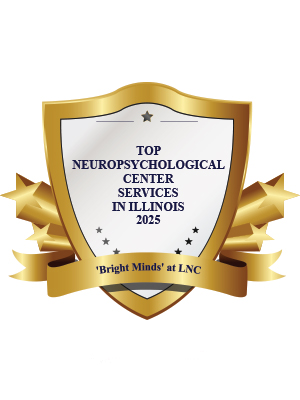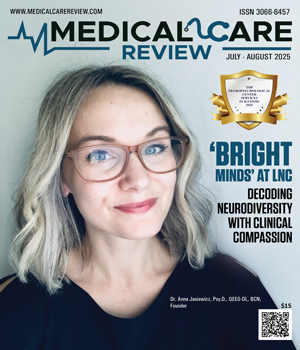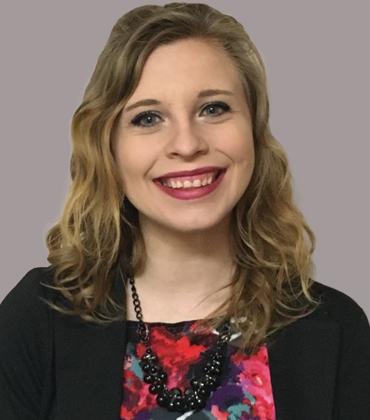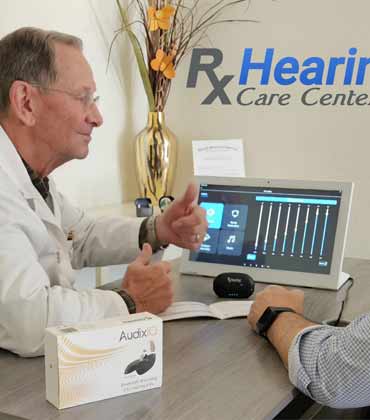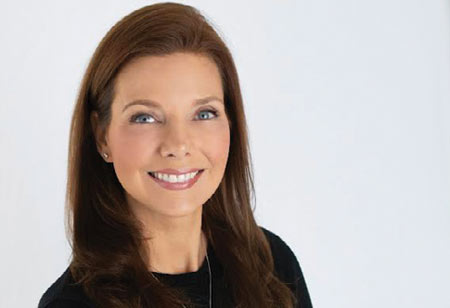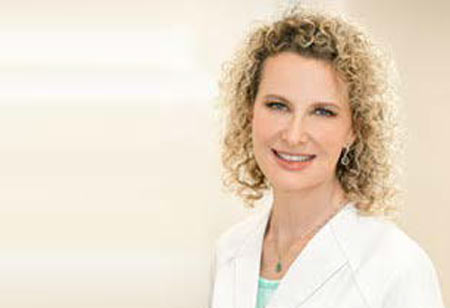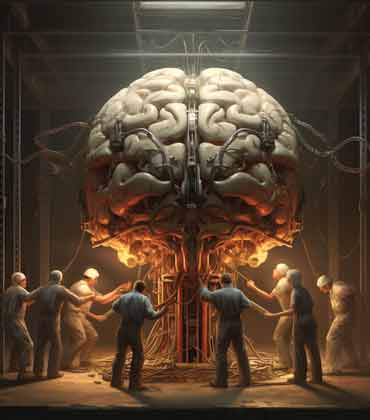Thank you for Subscribing to Medical Care Review Weekly Brief
- Home
- July-August 2025
Medical Care Review: Specials Magazine
By the time most families reach out to Bright Minds LNC, they’ve already tried everything else; tutors, therapists, behavioral charts, specialized schools, endless googling. They’ve followed every piece of conventional advice, implemented structure, and attempted to “fix” their child. But nothing explained why their gifted, creative child, who could build entire worlds with LEGOs, couldn’t sit still during class and had meltdowns over homework. What if the problem wasn’t the child? What if it was the system? Bright Minds LNC was born from this theory—and today, it’s shifting the paradigm of how we understand and support both neurodivergent children and adults. Instead of trying to mold them into what the system expects, the clinic focuses on understanding and embracing their neurodivergence, giving them the support and tools their nervous system needs to thrive in a neurotypical world. “I call them brain styles and neurotypes, not disorders,” says Founder Dr. Anna Jasiewicz, Psy.D., QEEG-DL, BCN. “We see neurodivergence as part of one’s identity with the goal of not inherently changing who people are, but rather addressing any challenges and barriers that arise from being neurodivergent.” Its integrated evidence-informed model goes beyond categorizing behaviors and instead focuses on understanding neurodiversity and just how each brain uniquely supports daily activities. The clinic is entirely run by a team of neurodivergent mental health providers who collaborate to create individualized care pathways, providing care through a lens that recognizes strengths and adapts expectations. It provides practical support and solutions, but most importantly, creates spaces where they feel a sense of belonging and can embrace their authentic self. “Every individual is unique,” says Dr. Jasiewicz. We make sure that uniqueness is acknowledged and embraced with curiosity, compassion and the kind of tailored support that truly changes lives. Discovering the Human Behind the Behavior Making people feel comfortable in their own skin is the first step toward success. Bright Minds LNC champions it. Known for its neuropsychological evaluations, the clinic transforms assessment into a therapeutic intervention, where each test prioritizes a people-first perspective over a narrow focus on Diagnostic and Statistical Manual of Mental Disorders labels. It all starts with a testing environment specifically designed to meet the sensory and emotional needs of neurodivergent individuals. The room isn’t defined by harsh lighting, strong fragrances or overwhelming stimuli, encouraging individuals to talk more freely about their passionate interests and hobbies.
Top Mental Health Services Provider 2025
The ultimate goal of an ABA therapy center is to support children on the autism spectrum and those with related developmental disabilities, along with their families. It’s about helping all children thrive, especially those with communication challenges and other developmental delays. Which is why the first time Steven tapped Abigail Evenson’s — BCBA at Hennepin Autism Center— shoulder and pointed to the toy at the desk was a profound moment for her. It was a simple gesture that signified a beautiful journey and remarkable growth. Just four years ago, he was nonverbal and struggled with behaviors like spitting, self-injury, aggression and running, overwhelming those around him. Abigail and the team at Hennepin worked patiently to understand and decode Steven’s behaviors. They found that many of his challenges stemmed from a lack of communication skills, which left him unable to express basic needs or emotions. Using ABA therapy, they introduced replacement strategies to help him find alternative ways to interact with the world. One of the first strategies was teaching Steven to tap someone’s shoulder to get attention instead of acting out. It was a small but meaningful first step. Slowly but steadily, he began forming sounds, words and eventually sentences. “We tailor our care to meet the unique strengths and challenges of each child, knowing that given the right support, every child can grow, learn and reach their full potential,” says Sulieman Isse, CEO. A child’s journey at Hennepin usually starts with a thorough diagnostic assessment. The process includes in-depth observations and evaluations to understand a child’s needs and preferences. Tools like the VB-MAPP assessment are used to test skills like communication, play, imitation and motor skills. These observations help identify strengths and areas requiring targeted intervention. After assessment, an adaptable treatment plan is tailored alongside parents, ensuring flexibility to the child’s evolving needs. The therapy itself is dynamic and responsive. Each child has their own cubicle, designed to be both functional and personalized, reflecting their individuality. Daily schedules balance desk-based learning with sensory activities like play gym sessions, tactile explorations and fine motor skill exercises. By working in 15-minute increments, therapists maintain the child’s focus while accommodating their sensory needs. Rewards like fidget toys or edible treats are strategically used to motivate and reinforce positive behavior, always keeping the child’s well-being at the forefront. The center places a strong emphasis on developing the learners’ communication skills. For nonverbal children like Steven, picture exchange systems, sign language or speech devices like augmentative and alternative communication (AAC) devices are introduced as alternative communication methods. Beyond reducing their frustration these tools also pave the way for verbal communication for the children, helping them break out of behaviors and grow as individuals..
Audiology Center 2025
In the heart of Clearwater, FL, a quiet revolution in hearing care is taking place. RxHearing, under the leadership of CEO and co-founder Chuck Ottaviano, is reshaping the accessibility and affordability of hearing health solutions across the U.S. With more than three decades of experience in the hearing aid industry, Ottaviano brings a wealth of expertise to the table. His vision is to bridge the gap between cutting-edge hearing technology and underserved communities, particularly in rural America. “For too long, hearing care has been out of reach for millions. With over 43 million Americans experiencing hearing loss, many have faced prohibitive costs and limited access to solutions. Our goal is to make hearing care accessible to everyone,” Ottaviano says. “By partnering with local pharmacies, we bring hearing health solutions directly to the communities that need them most.”
Practitioner Insights
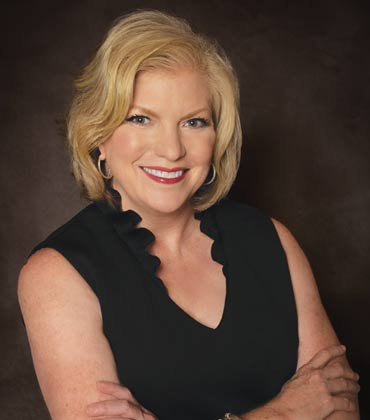
Destigmatizing Mental Health in Healthcare Space
Anne Mary K. Montero, Medical Director, Indiana University Health
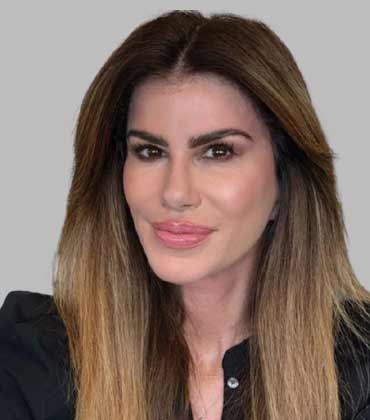
Advancing Mental Health: Insights and Strategies in Cognitive Behavioral Therapy
Beverly Wertheimer, Psychotherapist-Adolescent and Family Mental Health, Clinical Advisory Board Member, Daybreak Health
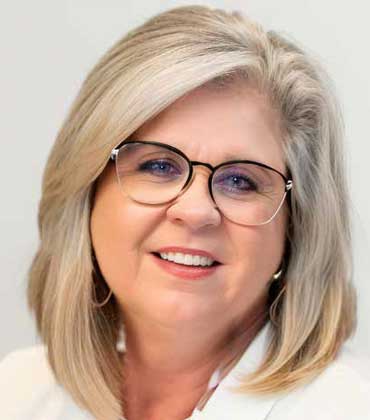
Transforming Mental Health through EMDR Therapy: A Leader's Perspective
Eileen Borski, LPC, Mental Health Counselor, Spring Health
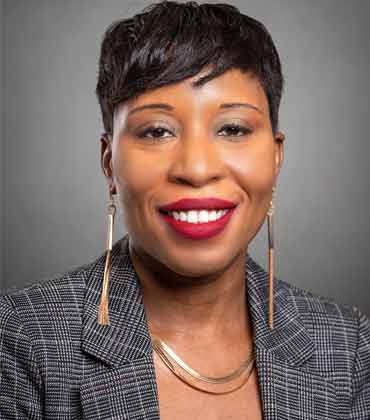
Eliminating the Barriers to Mental Health
Audrey Neylon, System Director Mental Health and Addiction – Business Solutions, Fairview Health Services
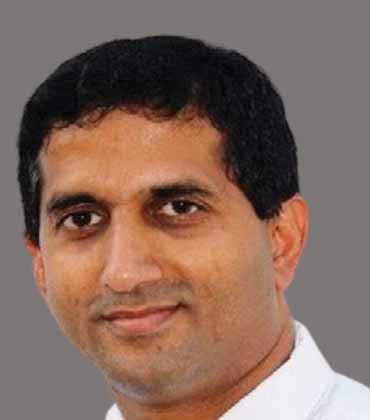
Role of Consumer Satisfaction in Psychiatric Care
Thomaskutty Idiculla, Director of Mental Health Services Evaluation, McLean Hospital
IN FOCUS
EDITORIAL
Neuro-Informed Services for Evolving Mental Health Needs
Mental health today involves a careful balance of emotional well-being, behavior and brain function. As conversations about anxiety, memory loss and mood disorders become more common, more people understand that effective care must combine empathy with evidence. Neuropsychology and audiology play a critical role in this effort, connecting what we feel and hear with how the brain interprets and responds. Innovations in AI are moving this field forward. Leading neuropsychology centers now rely on innovative cognitive assessment tools that can spot patterns too subtle for the human eye alone. These insights help catch conditions like ADHD, Alzheimer’s and traumatic brain injuries earlier and more accurately. Digital therapeutics and intelligent mental health apps bridge the gap between the clinic and daily life. AI chatbots provide around-the-clock support based on proven therapy methods. Personalized modules work with wearables to adjust care as a person’s needs change. Better links between hearing and cognitive health are also transforming care. In older adults, untreated hearing loss increases mental strain, encourages social withdrawal and can speed up dementia. Modern approaches combine audiology with cognitive screening, so no warning signs go unnoticed. These advances show up in market growth. By 2030, the mental health services, neuropsychology and audiology sectors are projected to reach $17.52 billion, $65,224.5 million and $21,123.3 million, growing at annual rates of 14.6 percent, 5.56 percent and 6.24 percent, respectively. Behind these numbers is a shift toward proactive support and continuous care, shaped by technology, data and a deeper understanding of how the mind works. The magazine features thought leadership articles from Audrey Neylon, System Director of Mental Health and Addiction—Business Solutions at Fairview Health Services, highlighting current challenges in the mental health sector and how organizations can deliver improved mental health outcomes to patients. Eileen Borski, LPC, Mental Health Counselor at Spring Health, sheds light on transforming mental health care by integrating EMDR therapy and neuro-informed practices, emphasizing trauma healing, personalized care and the power of evidence-based innovation. We also spotlight the stories of companies delivering fresh thinking in mental health care. One such example is ‘Bright Minds’ at LNC, a company reshaping support by recognizing neurodiversity as an identity rather than a disorder and combining lived experience with science-backed care to offer compassionate, nonpathologizing help. In this edition, which highlights leading mental health service providers, neuropsychological centers and audiology clinics, we aim to help you find the right partner for your organization’s needs.

